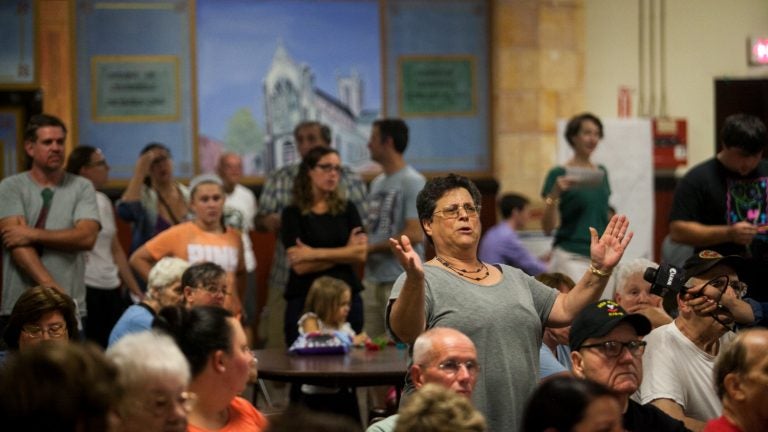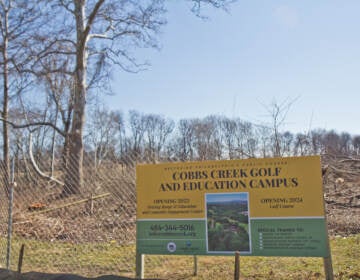Planning Commission votes down bill that would help Philly community groups pay for insurance
The city will not be paying your local community organization’s insurance bill anytime soon.

Residents of Fishtown were provided an open forum to voice their opinions on a proposal to convert Saint Laurentius Church into twenty-three apartments. (Brad Larrison for WHYY, file)
The city will not be paying your local community organization’s insurance bill anytime soon. That’s the upshot of a City Planning Commission meeting that ended Tuesday with commissioners unanimously voting against Councilman Bobby Henon’s effort to have the city pay for Directors and Officers Insurance for registered community organizations. The Planning Commission’s recommendation against the bill is purely advisory.
“We recognize the bill seeks to address a real problem,” said Ayse Unver, a staffer with the Planning Commission. “But we believe the bill imposes an administrative and financial burden on the city without providing enough detail on how to address those challenges.”
Introduced in May, Henon’s bill seeks to protect neighborhood nonprofits from frivolous lawsuits that can send insurance premiums skyrocketing. A handful of prominent community organizations have almost been sued out of existence in the last couple years, including those representing Bella Vista and Fishtown.
The legislation would only cover the registered community groups that are certified by the city to review proposed zoning changes and weigh in on an advisory basis. Though 90 percent of the time the city’s zoning board ignores any objections brought by the groups and greenlight projects, their judgments can delay, or even derail a builder’s plans.
The relative power yielded by these organizations, known as RCOs, makes them vulnerable to so-called strategic lawsuits against public participation (SLAPPs) like the cases that crippled resident involvement in Bella Vista and Fishtown.
But while acknowledging the risks that community groups face, the Planning Commission said the bill was too vague and broad-reaching to solve the problem efficiently. Henon’s legislation wouldn’t provide RCOs with insurance outright. Instead, it would authorize the city to provide funds to “help offset the cost” of premiums and includes broad directives to the Planning Commission to institute guidelines for the distribution of funding for insurance. As far as accountability goes, the bill asks the city’s director of finance to issue a report to City Council annually on the distribution of funds.
“This should not move forward,” said Peilin Chan, the city’s budget director for capital. Chan made her recommendation against the bill on behalf of Rob Dubow, the city’s director of finance and a member of the advisory board.
Tuesday’s hearing also included a vote against a bill by Councilman Kenyatta Johnson that proposes a dramatic increase to the number of properties that must receive notifications when a neighbor seeks a change in their zoning. The Point Breeze councilman’s bill would require those seeking a change to alert every property within a 500-foot radius, doubling the current 250-foot requirement so property owners could have to notify neighbors as far as four blocks away. Planning Commission staffers estimate that the increased radius would triple the number of households notified about zoning appeals.
The Planning Commission staffers noted that Johnson’s bill would have an especially profound impact if enacted in tandem with a similar bill promoted by Councilwoman Cindy Bass. That controversial legislation would require property owners to send two rounds of mail notification to those who are legally required to be alerted of a proposed zoning variance. The current law allows for fliers to be posted — a less costly proposition. Bass’s bill was amended again last Thursday and could be passed out of Council as early as this week.
Together, the two bills could add thousands of dollars to the cost of everything from establishing a new daycare to building a new high rise apartment building.
Commissioner Maria Gonzalez, president of HACE, called Johnson’s bill “a burden on smaller applicants.” Commissioner Cheryl Gaston described Johnson’ bill as potentially “very expensive.”
Even the one RCO representative who spoke at the Commission hearing didn’t seem happy with the idea. He said that expanding the notification radius could dilute the voices of those who live close to a proposed project.
“The more people who come, the more confusion there is,” said Chuck Bode, of the West Powelton/Saunders Park RCO.
Johnson has argued that the current standards for alerting people are too limited. In the part of South Philadelphia that the Councilman represents he’s found that as much as a third of a block can end up outside the notification radius.
“Frankly, that can torpedo any discussion with developers,” said Dillon Mahoney, a legislative assistant with Johnson’s office. “It’s a very negative start to a conversation when folks feel like they are being excluded from the conversation.”
Mahoney said that the Councilman recognizes that the bill would unnecessarily burden smaller properties and that “some kind of carve out” is being considered.
The Planning Commission’s veto of the bill is advisory. A spokesperson for Johnson said staff is in talks with Cindy Bass’s office to find a way to lessen potential burdens on small property owners and move one or both of the notification requirements forward.
WHYY is your source for fact-based, in-depth journalism and information. As a nonprofit organization, we rely on financial support from readers like you. Please give today.






